This week’s theme emerged with little effort or deliberation. I moved house a few days ago, taking my very young children to complete their business of growing elsewhere, leaving them with no memory of the four walls that welcomed them after their first journey home from the hospital.
It’s probably natural, then, that I’ve been thinking about houses and homes, searching for insights to help me cultivate the right conditions for new roots to take hold. After all, as any good gardener knows, not every plant thrives when transplanted into unfamiliar soil.
What follows includes ideas about home as memory (Bachelard, Szerb, Larkin), as shelter (Goethe, Angelou), as nostalgia (Homer, Baum, Hesse, Milosz), as cultural signifier (Coward, Fitzgerald), as metaphor for human experience and creativity.
A more practical man might have read the homebuyers report...
Tarsila do Amaral, Idyll, 1929
‘If I were asked to name the chief benefit of the house I should say: The house shelters daydreaming, the house protects the dreamer, the house allows one to dream in peace.’
Gaston Bachelard, The Poetics of Space, 1958
‘When I was at High School my favourite pastime was walking. Or rather, loitering. If we are talking about my adolescence, it's the more accurate word. Systematically, one by one, I explored all the districts of Pest. I relished the special atmosphere of every quarter and every street. Even now I can still find the same delight in houses that I did then. In this respect I've never grown up. Houses have so much to say to me. For me, they are what Nature used to be to the poets - or rather, what the poets thought of as Nature.
But best of all I loved the Castle Hill District of Buda. I never tired of its ancient streets. Even in those days old things attracted me more than new ones. For me the deepest truth was found only in things suffused with the lives of many generations, which hold the past as permanently as mason Kelemen's wife buried in the high tower of Deva.
Antal Szerb, Journey by Moonlight, 1937
House with Drying Laundry, Egon Schiele, 1917
‘Nevertheless I long—I pine, all my days— to travel home and see the dawn of my return. And if a god will wreck me yet again on the wine-dark sea, I can bear that too, with a spirit tempered to endure. Much have I suffered, labored long and hard by now in the waves and wars. Add this to the total—bring the trial on!’
Homer, The Odyssey, c. 8th Century BC
‘Home is so sad. It stays as it was left, / Shaped to the comfort of the last to go / As if to win them back. Instead, bereft / Of anyone to please, it withers so, / Having no heart to put aside the theft
And turn again to what it started as, / A joyous shot at how things ought to be, / Long fallen wide. You can see how it was: / Look at the pictures and the cutlery. / The music in the piano stool. That vase.’
Philip Larkin, Home is so Sad, 1964
‘“One never reaches home,” she said.
“But where paths that have an affinity for each other intersect, the whole world looks like home, for a time.”’
Hermann Hesse, Demian, 1919
An apartment building in Tokyo Bay, Tokyo, Japan
‘It amazed him—he had never been in such a beautiful house before. But what gave it an air of breathless intensity was that Daisy lived there—it was as casual a thing to her as his tent out at camp was to him. There was a ripe mystery about it, a hint of bedrooms upstairs more beautiful and cool than other bedrooms, of gay and radiant activities taking place through its corridors and of romances that were not musty and laid away already in lavender but fresh and breathing and redolent of this year's shining motor cars and of dances whose flowers were scarcely withered. It excited him too that many men had already loved Daisy—it increased her value in his eyes. He felt their presence all about the house, pervading the air with the shades and echoes of still vibrant emotions.’
F. Scott Fitzgerald, The Great Gatsby, 1925
The Yellow House, Vincent van Gogh, 1888
‘I had rather be shut up in a very modest cottage, with my books, my family and a few old friends... letting the world roll on as it likes, than to occupy the most splendid post which any human power can give.’
Thomas Jefferson, letter to A. Donald, 1788
And so, beyond all the positive values of protection, the house we were born in becomes imbued with dream values which remain after the house is gone. Centers of boredom, centers of solitude, centers of daydream group together to constitute the oneiric house which is more lasting than the scattered memories of our birthplace. Long phenomenological research would be needed to determine all these dream values, to plumb the depth of this dream ground in which our memories are rooted.’
Gaston Bachelard, The Poetics of Space, 1958
Casas, Alfredo Volpi, 1957
‘1. Building is really dwelling.
2. Dwelling is the manner in which mortals are on the earth.
3. Building as dwelling unfolds into the building that culti- vates growing things and the building that erects buildings.
If we give thought to this threefold fact, we obtain a clue and note the following: as long as we do not bear in mind that all building is in itself a dwelling, we cannot even adequately ask, let alone properly decide, what the building of buildings might be in its nature. We do not dwell because we have built, but we build and have built because we dwell, that is, because we are dwellers. But in what does the nature of dwelling consist? Let us listen once more to what language says to us. The Old Saxon wwon, the Gothic wunian, like the old word bauen, mean to remain, to stay in a place. But the Gothic wunian says more distinctly how this remaining is experienced. Wunian means: to be at peace, to be brought to peace, to re- main in peace. The word for peace, Friede, means the free, das Frye, and fry means: preserved from harm and danger, preserved from something, safeguarded. To free really means to spare. The sparing itself consists not only in the fact that we do not harm the one whom we spare. Real sparing is something positive and takes place when we leave something beforehand in its own nature, when we return it specifically to its being, when we "free" it in the real sense of the word into a preserve of peace. To dwell, to be set at peace, means to remain at peace within the free, the preserve, the free sphere that safeguards each thing in its nature. The fundamental character of dwelling is this sparing and preserving. It pervades dwelling in its whole range. That range reveals itself to us as soon as we reflect that human being consists in dwelling and, indeed, dwelling in the sense of the stay of mortals on the earth.’
Martin Heidegger, Building, Dwelling, Thinking, 1954
‘Our house is a very, very, very fine house / With two cats in the yard / Life used to be so hard / Now everything is easy 'cause of you
I'll light the fire / While you place the flowers in the vase / That you bought today’
Crosby, Stills, Nash and Young, Our House, 1970
Interior, Pierre Bonnard, 1913
‘For the first time, Hazel began to realize how much they had left behind. The holes and tunnels of an old warren become smooth, reassuring and comfortable with use. There are no snags or rough corners. Every length smells of rabbit—of that great, indestructible flood of Rabbitry in which each one is carried along, sure-footed and safe. The heavy work has all been done by countless great-grandmothers and their mates.’
Richard Adams, Watership Down, 1972
‘Warren,’ she said, ‘he has come home to die:
You needn’t be afraid he’ll leave you this time.’
‘Home,’ he mocked gently.
‘Yes, what else but home?
It all depends on what you mean by home.
Of course he’s nothing to us, any more
Than was the hound that came a stranger to us
Out of the woods, worn out upon the trail.’
‘Home is the place where, when you have to go there,
They have to take you in.’
Robert Frost, The Death of the Hired Man, 1914
‘If the heart of Africa still remained elusive, my search for it had brought me closer to understanding myself and other human beings. The ache for home lives in all of us, the safe place where we can go as we are and not be questioned. It impels mighty ambitions and dangerous capers.. We shout in Baptist churches, wear yarmulkes and wigs and argue even the tiniest points in the Torah, or worship the sun and refuse to kill cows for the starving. Hoping that by doing these things, home will find us acceptable or that barring that, we will forget our awful yearning for it.’
Maya Angelou, All God's Children Need Traveling Shoes: An Autobiography, 1986
‘A house is a machine for living in.’
Le Corbusier, Towards a New Architecture, 1923
The Revolving House, Paul Klee, 1921
‘I cannot understand why you should wish to leave this beautiful country and go back to the dry, gray place you call Kansas."
“That is because you have no brains,” answered the girl. “No matter how dreary and gray our homes are, we people of flesh and blood would rather live there than in any other country, be it ever so beautiful. There is no place like home.”’
Frank Baum, The Wizard of Oz, 1900
‘"No; not immediately here. We are rather out of distance of the very striking beauties which attract the sort of parties you speak of; and we are a very quiet set of people, I believe; more disposed to stay at home than engage in schemes of pleasure."
"Ah! there is nothing like staying at home for real comfort. Nobody can be more devoted to home than I am. I was quite a proverb for it at Maple Grove’
Jane Austen, Emma, 1815
The Little Street, Johannes Vermeer, 1658
‘The Stately Homes of England, / How beautiful they stand, / To prove the upper classes / Have still the upper hand; / Though the fact that they have to be rebuilt / And frequently mortgaged to the hilt / Is inclined to take the gilt / Off the gingerbread, / And certainly damps the fun / Of the eldest son-
But still we won't be beaten, / We'll scrimp and scrape and save, / The playing fields of Eton / Have made us frightfully brave- / And though if the Van Dycks have to go / And we pawn the Bechstein Grand, / We'll stand / By the Stately Homes of England.’
Extract from The Stately Homes of England, Song by Noël Coward
A Cottage Home, George Bernard O'Neill, 1875
‘This is the true nature of home – it is the place of Peace; the shelter, not only from all injury, but from all terror, doubt, division. In so far as it is not this, it is not home; so far as the anxieties of the outer life penetrate into it, the inconsistently-minded, unknown, unloved, or hostile society of the outer world is allowed by either husband or wife to cross the threshold, it ceases to be home; it is then only a part of that outer world which you have roofed over and lifted fire in.’
John Ruskin, Sesame and Lilies, 1897
‘Make two homes for thyself, my daughter. One actual home in thy cell, that thou go not running about into many places, unless for necessity, or for obedience to the prioress, or for charity's sake; and another spiritual home, which thou art to carry with thee always-the cell of true self knowledge, where thou shalt find within thyself knowledge of the goodness of God.’
Saint Catherine of Siena, letter to her daughter, c.1370
‘The man of high descent may love the halls and lands of his inheritance as a part of himself, as trophies of his birth and power; the poor man's attachment to the tenement he holds, which strangers have held before, and may tomorrow occupy again, has a worthier root, struck deep into a purer soil; his household gods are of flesh and blood, with no alloy of silver, gold, or precious stones; he has no property but in the affections of his own heart and when they endear bare floors and walls, despite of toil and scanty meals, that man has his love of home from God, and his rude hut becomes a solemn place.’
Charles Dickens, The Old Curiosity Shop, 1841
‘I say Mother. And my thoughts are of you, oh, House! House of the lovely dark summers of my childhood.’
Czesław Miłosz, O.V. de Milosz (1877-1939)
Red House, Kazimir Severinovich Malevich, 1932





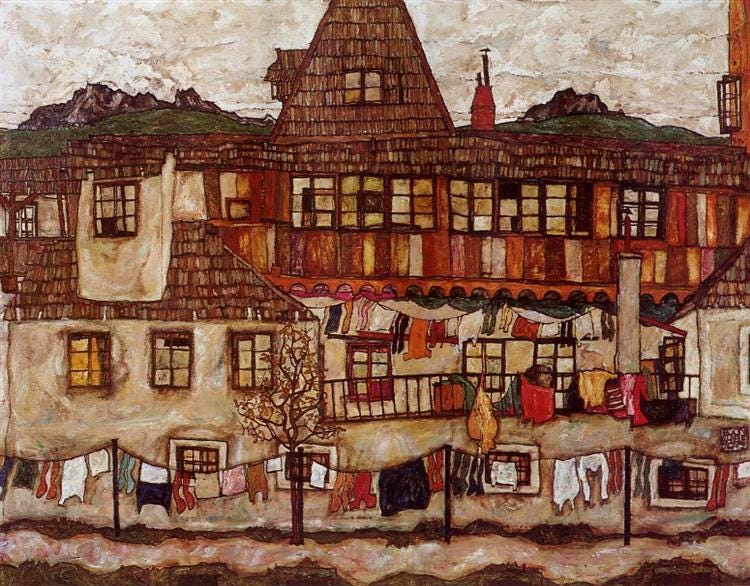
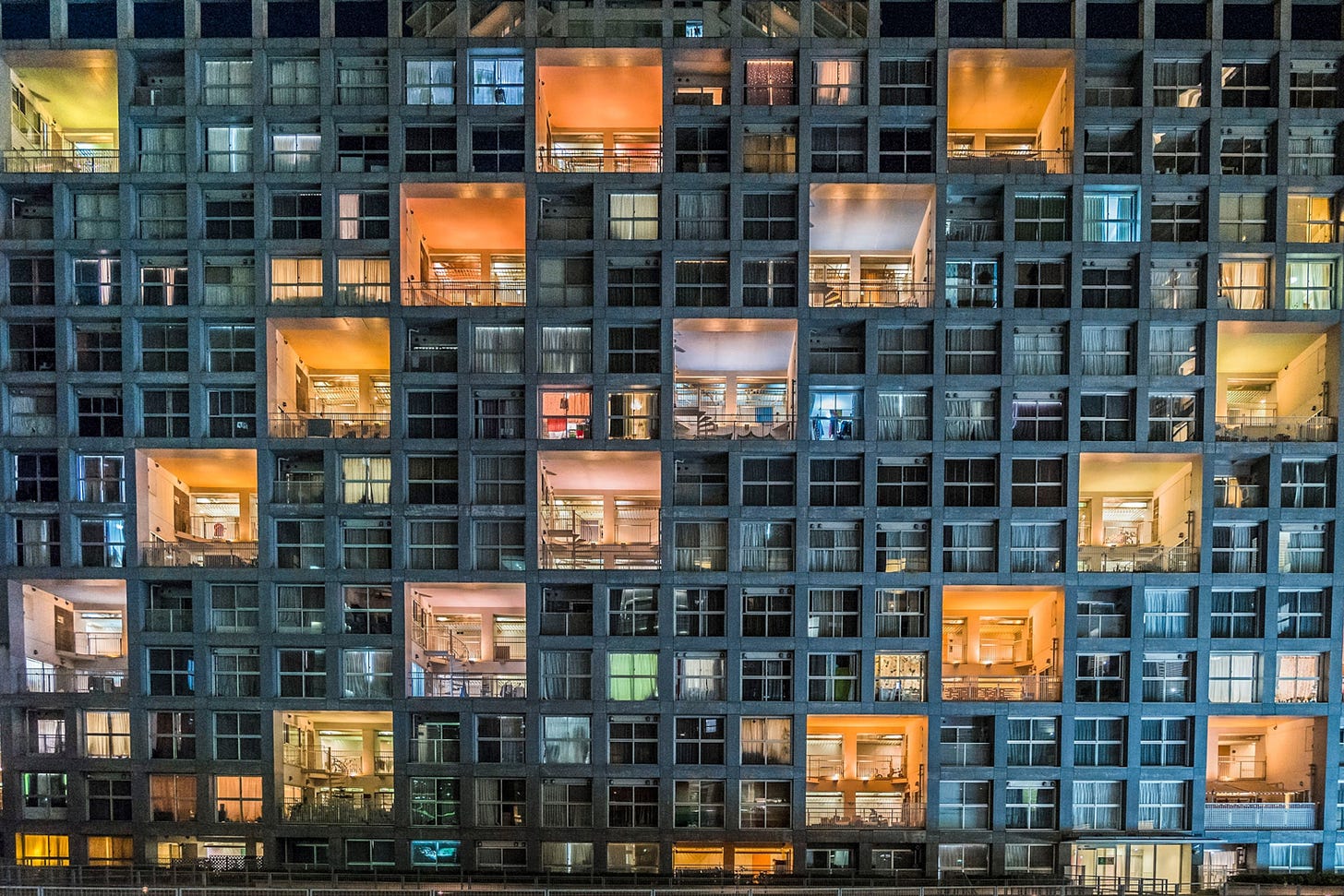
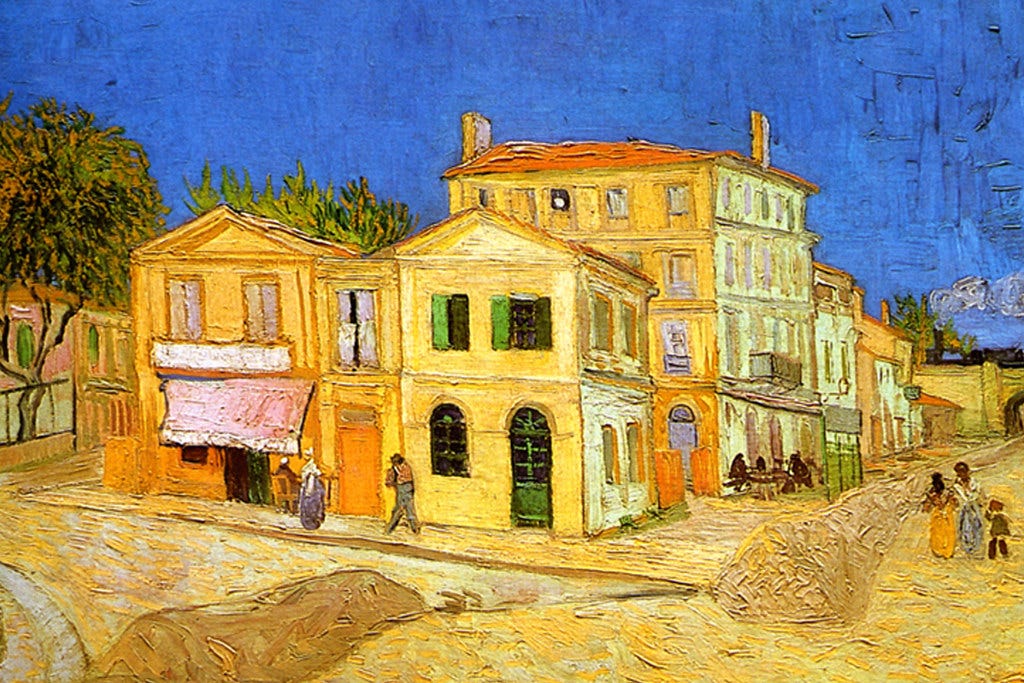
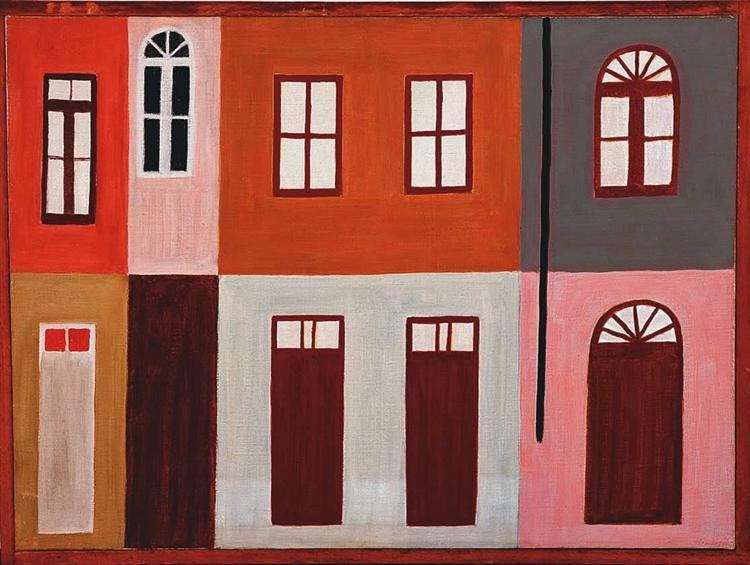
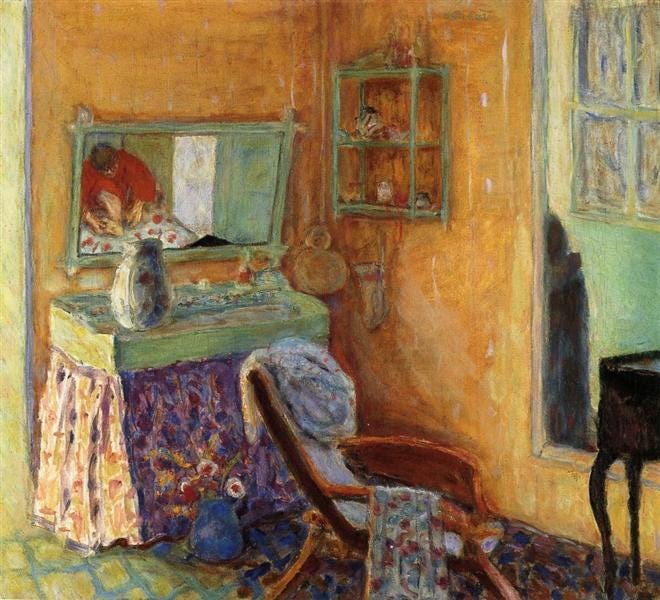
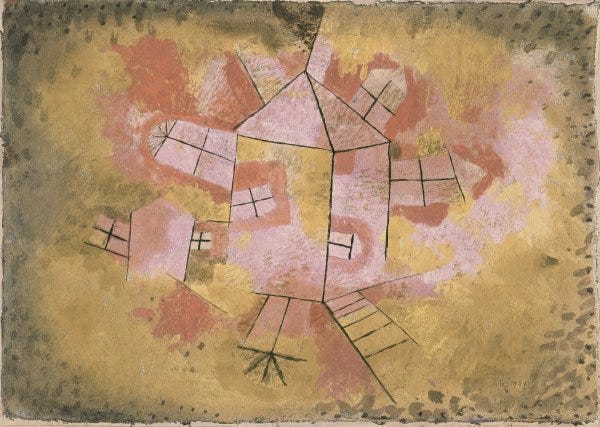
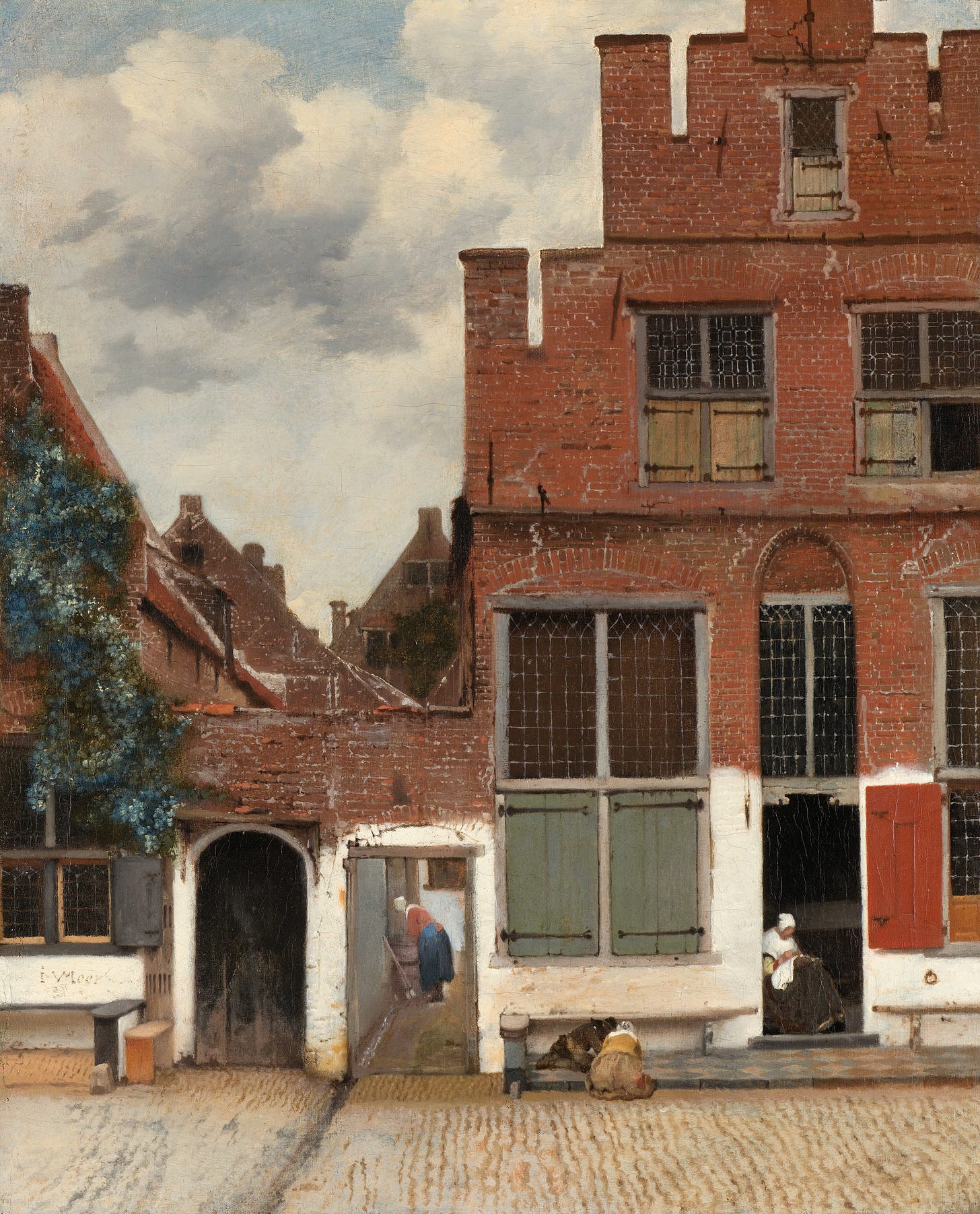
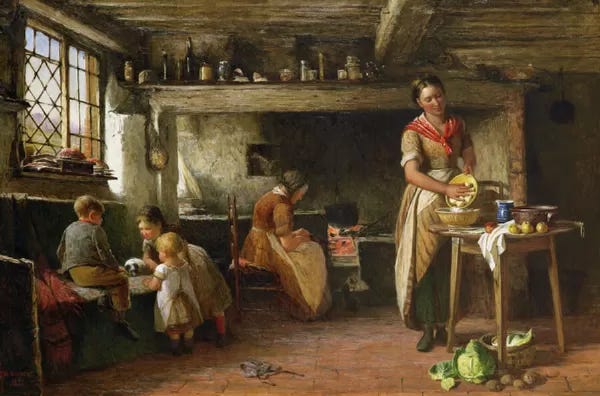
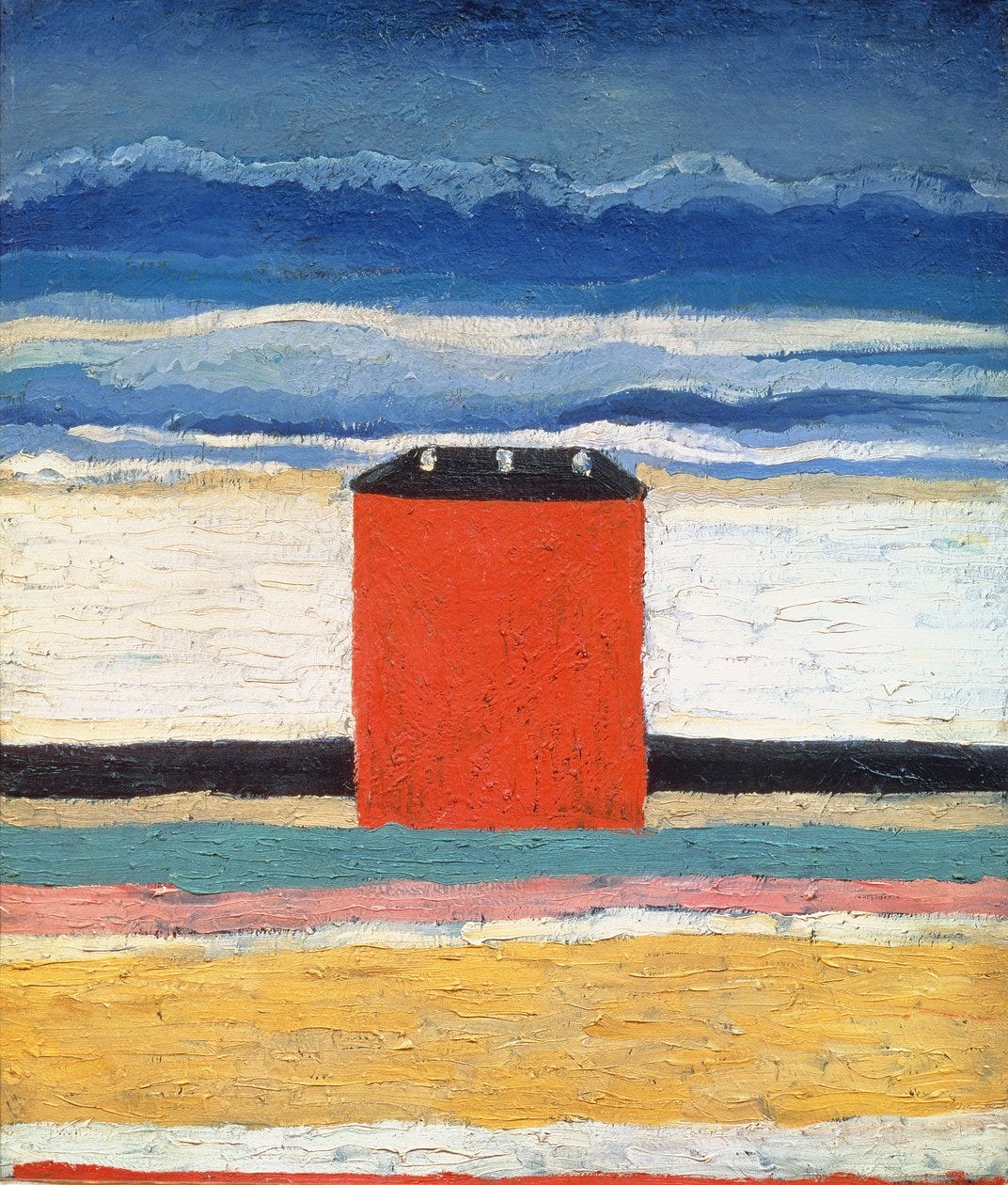
I devoured it! What a marvellous way to wake up this morning, at home with my cup of tea.
Delightful compilation...